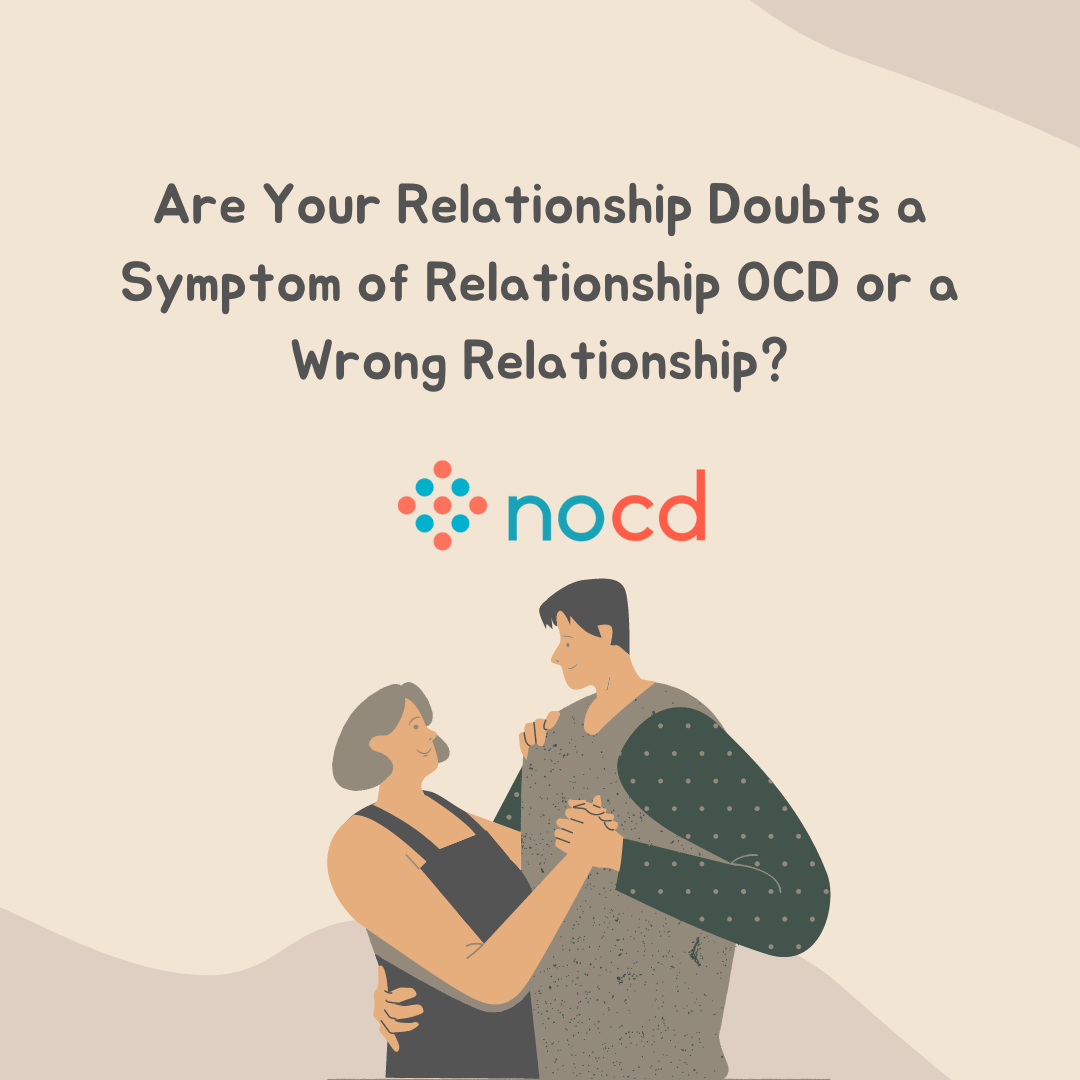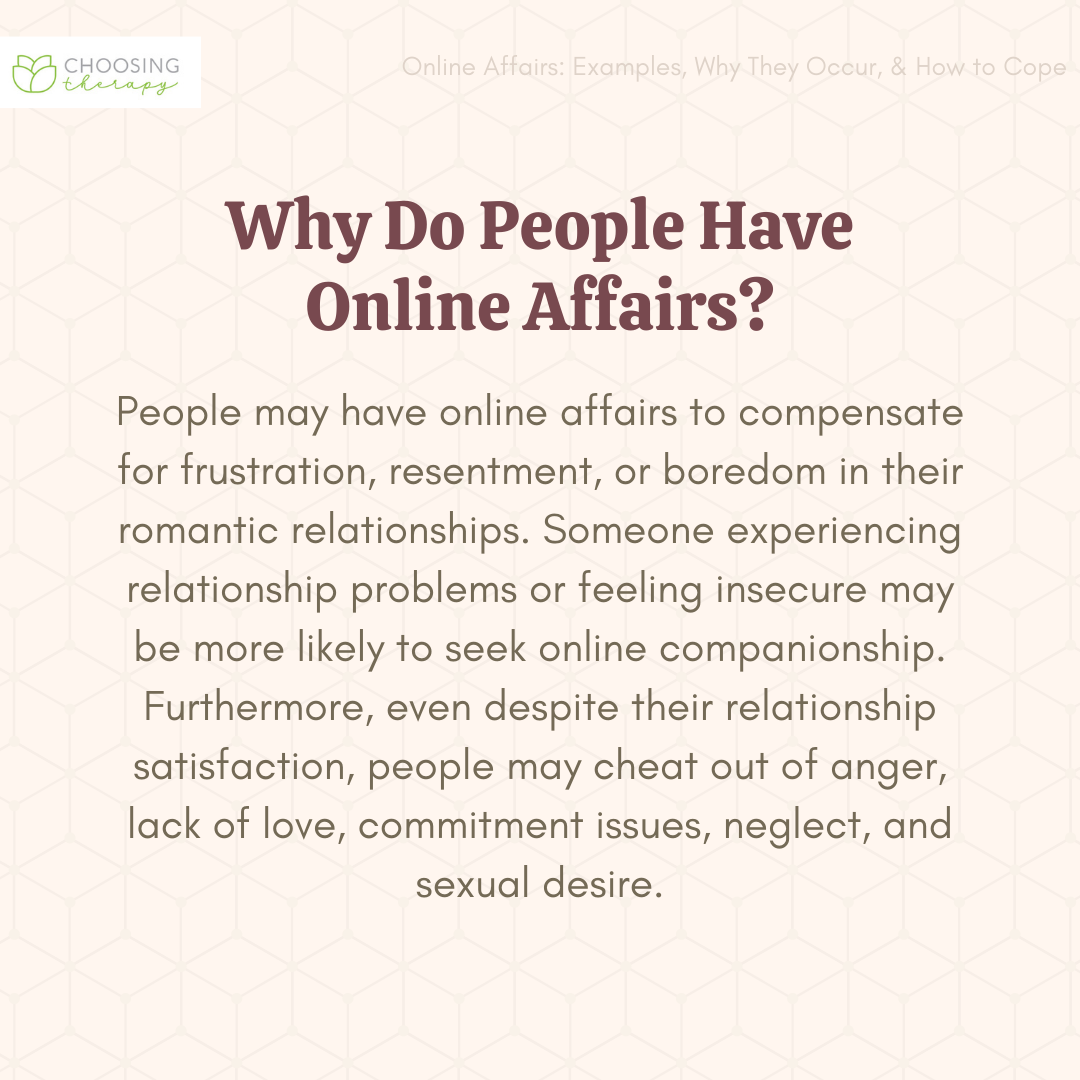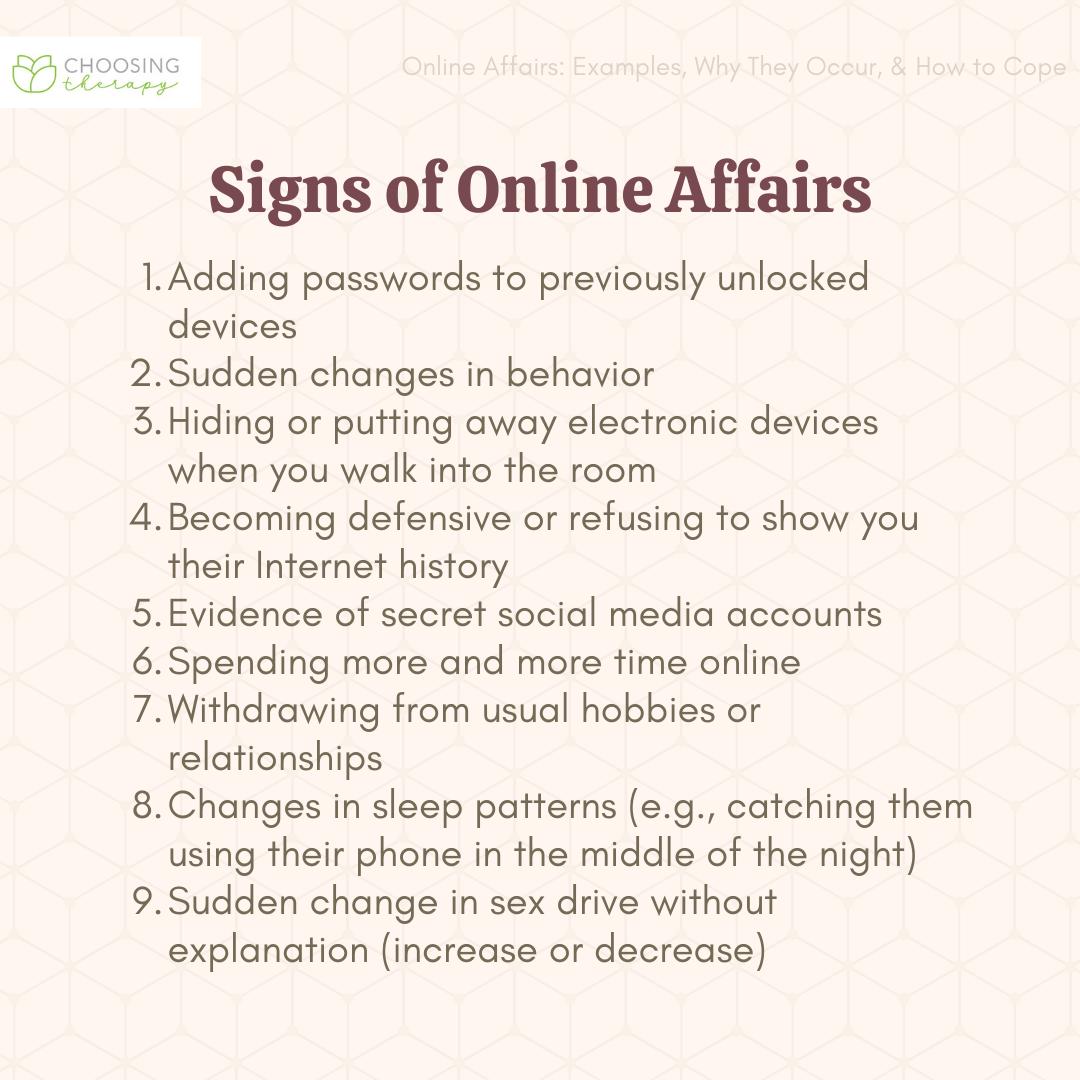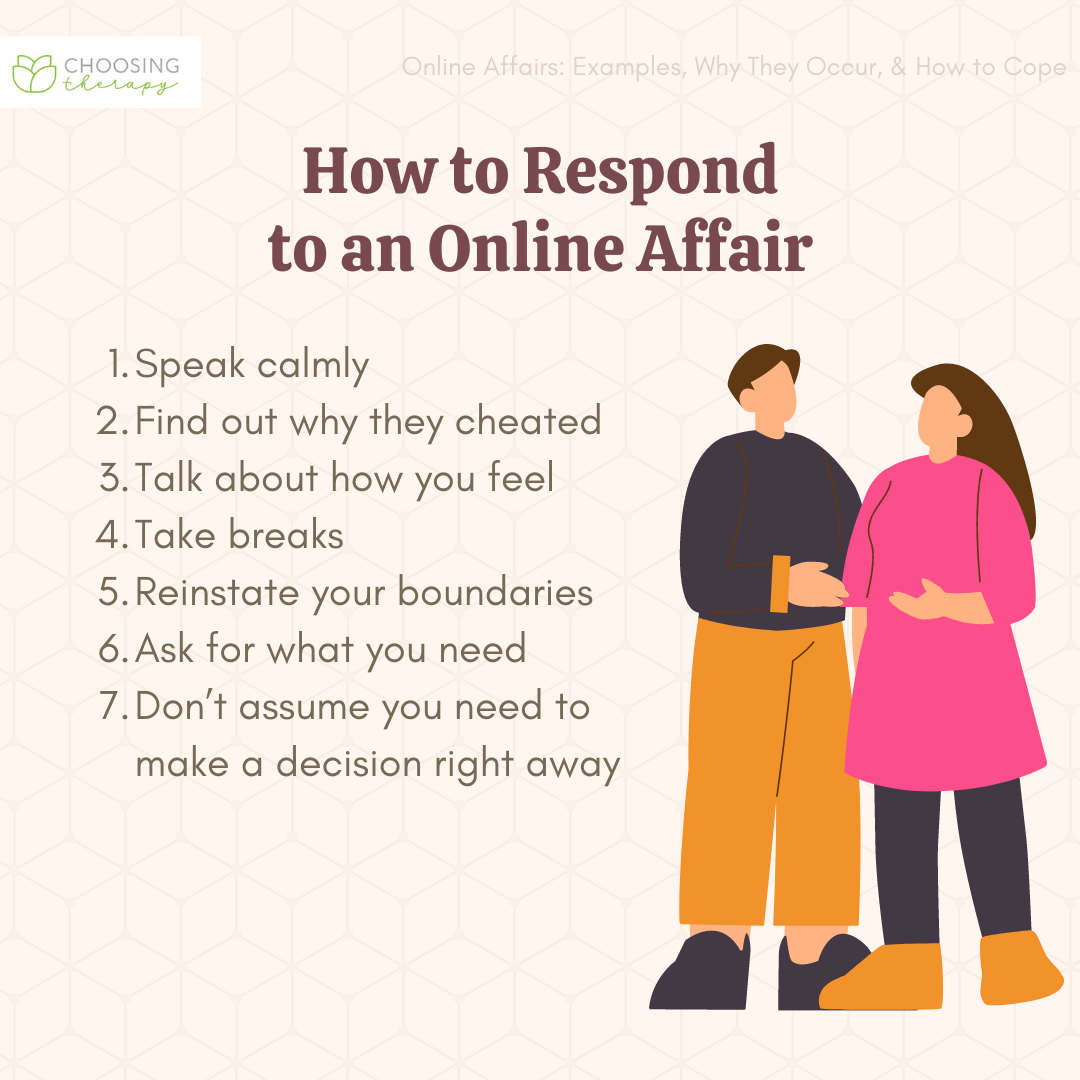Online infidelity can occur through any digital platform, including chat rooms, email, and social media. Online infidelity can be more difficult to spot than other forms of cheating, and can also lead to in-person emotional or physical infidelity, so it is important to become familiar with what they may look like and how to cope.
Whether you’re trying to move on or rebuild a relationship, a licensed therapist from BetterHelp can guide you.
BetterHelp has over 20,000 licensed therapists who provide convenient and affordable online therapy. BetterHelp starts at $65 per week. Take a Free Online Assessment and get matched with the right therapist for you.
How Do Online Affairs Start?
Online affairs are generally considered a form of infidelity when someone becomes romantically, sexually, or emotionally involved with someone outside of their committed relationship.1 However, this ultimately depends on each couple’s definition of what is considered cheating in their partnership.
Online affairs can start in multiple ways. They may begin with complete strangers, but they also could start with acquaintances, friends, or coworkers. Sometimes, online affairs can transform into in-person affairs. They don’t start with malicious intentions. In some cases, casual conversation can snowball into flirting that may be considered cheating. Other times, the person initiating an online affair is seeking external validation, romance, or connection.
Why Do People Have Online Affairs?
People may have online affairs to compensate for frustrations, resentment, or boredom in their romantic relationships. Someone experiencing relationship problems or feeling insecure may be more likely to seek online companionship. Furthermore, even despite their relationship satisfaction, people may cheat out of anger, lack of love, commitment issues, neglect, and sexual desire.2
Some people rationalize online affairs as “safer” or less problematic than in-person affairs. For example, they could assume that, if they’re not having sex with someone else, they’re still being faithful to the relationship. However, even if they aren’t sexting or texting inappropriately, they can still be unfaithful and have an emotional affair online.
9 Signs of Online Affairs
Regardless of your stance on what counts as infidelity, it’s important to know the general warning signs of online affairs. These can include changes in behavior and routines, decreased interest in the relationship, and increased time on their electronic devices.
Below are nine signs of an online affair:
- Adding passwords to previously unlocked devices
- Sudden changes in behavior
- Hiding or putting away electronic devices when you walk into the room
- Becoming defensive or refusing to show you their Internet history
- Evidence of secret social media accounts
- Spending more and more time online
- Withdrawing from usual hobbies or relationships
- Changes in sleep patterns (e.g., catching them using their phone in the middle of the night)
- Sudden change in sex drive without explanation (increase or decrease)
Examples of Online Affairs
Online affairs can look differently depending on the type, intensity, and relationship boundaries. For instance, some people consider watching porn to be cheating, while others might draw the line at patterns of micro cheating or sexting. Because social media platforms have different features, there are a large number of possibilities.
Some examples of online affairs include:3
- Inappropriately texting: Sending flirty texts to someone may coincide with having an online affair. Texts may also include sending inappropriate images or videos, or sexting.
- Flirting via Instagram DMs: “Sliding into” someone’s Instagram DMs is typically an example of online infidelity. This type of online cheating can occur between acquaintances or strangers.
- Using a cheating website: Some websites advertise setting up discreet affairs. Some of the websites offer algorithm-based matching, similar to dating websites, for people specifically seeking out affair partners.
- Using dating apps: People may use apps like Tinder, Bumble, Hinge, or OkCupid to engage in an online affair. They will usually withhold the fact that they’re in a relationship, or lie about being in an open or polyamorous relationship.
- Flirting in online forums: Online forums like Reddit allow like-minded individuals to come together, share ideas, and connect. Someone might seek an online affair by directly corresponding with a specific member (or set of members).
- Engaging with camgirls or camboys: Camgirls and camboys offer erotic streaming services via webcam. They typically work in exchange for money, and members can join their communities or engage in private viewing parties.
- Talking to other people on fake or alternative social media accounts: In this case, your partner may be using one or multiple secret social media accounts to interact with inappropriate content, such as porn, send a DM on Instagram, or exchange explicit pictures and videos with others.
How to Respond to an Online Affair
Discovering online infidelity can be incredibly painful for unsuspecting partners. You may feel insecure, shocked, frustrated, scared, or even revengeful. These feelings are normal, and it’s okay to feel them. That said, it’s also important to know how to confront your partner about the online affair.
Some tips for responding to online cheating include:4
- Speak calmly: Aim to be calm and neutral when you discuss the affair. Doing so increases the chances of having a productive conversation.
- Find out why they cheated: Consider asking your partner directly why they cheated. This answer can give you more information about the context of your relationship and your partner’s intentions moving forward.
- Talk about how you feel: You don’t need to hold back or conceal your feelings right now. Let your partner know how their actions affected you.
- Take breaks: If one or both of you becomes overactivated during the discussion, take a break. Walk away for a few minutes or until you feel calm.
- Reinstate your boundaries: If you decide to stay in the relationship, revisit your relationship boundaries. Emphasize the behaviors that are and are not acceptable and review the consequences you will reinforce if those boundaries are violated.
- Ask for what you need: Tell your partner what you need from them to heal and trust again. For example, you might want permission to check through their phone or have access to their passwords, but may not be sure how to verbalize it. However, asking for what you need helps you make sure you do not violate your partner’s boundaries down the road.
- Don’t assume you need to make a decision right away: If you aren’t sure how to proceed, that’s okay. Instead, trust that you can take the time to decide your next steps.
Recovering From Infidelity Or A Betrayal Of Trust
Individual Therapy – Whether you’re trying to move on or rebuild a relationship, a licensed therapist from BetterHelp can guide you. BetterHelp has over 20,000 licensed therapists who provide convenient and affordable online therapy. Visit BetterHelp
Couples & Marriage Counseling – Talkspace offers you and your partner the support and structure you need. It’s private, convenient, and affordable. Learn More
OurRelationship (Free Couples Course) – OurRelationship has been proven to help couples improve communication, intimacy, and trust. 94% would recommend it to a friend. Get Started
How to Cope With Online Infidelity
It’s common for people to feel depressed, anxious, resentful, and surprised after discovering infidelity. Affairs can lead to issues like infidelity PTSD and relationship PTSD. You may struggle with insecurity and trust issues moving forward. Self-care is important during this time. You need to be able to look after yourself while you feel vulnerable.
Some coping strategies include:
- Reaching out for social support
- Using positive affirmations
- Practicing gratitude
- Getting more involved with other friendships
- Engaging in meaningful hobbies or passions
- Staying grounded to your spiritual or religious beliefs
- Sticking to a daily routine that honors your mental and physical health
- Trying emotional self-care activities
When to Break Up
Sometimes, online affairs result in a breakup or divorce. Cheating can often be a sign of a toxic relationship. If your partner seems unwilling or uninterested in changing, that’s a significant red flag. Likewise, it’s impossible to rebuild trust in your relationship if you don’t believe your partner is capable of being honest with you.
There’s no “best” way to break up with someone. But, ideally, you should consider this option after you’ve identified that you no longer feel happy or safe in the relationship. Consider making a list of pros and cons if you feel ambivalent about what to do, or look into discernment counseling as an option.
When to Seek Professional Help for Online Infidelity
Marriage and couples therapy can help couples after infidelity if a couple chooses to work on their relationship. It helps each party understand why the affair occurred, resolve problems within the relationship, prioritize healthier communication, and restore intimacy and trust.
Individual therapy can also be helpful, as cheating can cause the betrayed partner to struggle with concerns such as low self-esteem, body image concerns, and betrayal trauma. The partner who cheated might also benefit from processing their actions separately, entirely without judgment. You can find the right therapist using an online therapist directory.
Some therapeutic methods for addressing online infidelity in a relationship include:5
- Marriage and couples counseling: Marriage and couples counseling can help both people understand and move past the affair. Consider looking for a therapist trained in the Gottman Method of couples therapy, emotionally focused couples therapy (EFT), or Imago Relationship Therapy (IRT).
- Individual therapy: Individual therapy can help you evaluate relationship goals, rebuild a sense of self-esteem, and explore how you want to move forward with your partner. This option is helpful to both parties, especially if they feel angry, sad, or betrayed. Consider looking for a therapist trained in cognitive-behavioral therapy (CBT), interpersonal psychotherapy (IPT), or attachment-based therapy.
- Online therapy: Online therapy offerings for individual and couples therapy can be helpful for clients with busy schedules, as it provides greater convenience and accessibility.
- Family therapy: Sometimes marital issues also represent larger family issues. If problems affect children in the home, it may be helpful to consider family therapy in conjunction with individual and/or couples counseling. Look for a therapist trained in family systems therapy, which focuses on all interactions and behaviors within a group.
Final Thoughts
Online infidelity can be just as damaging and devastating as in-person infidelity. It’s important to establish boundaries in your relationship and outline what is and isn’t appropriate online behavior. If your partner violates your trust, it doesn’t mean the relationship is inherently doomed. However, it is important to consider what you need to move forward and care for yourself.
Additional Resources
To help our readers take the next step in their mental health journey, Choosing Therapy has partnered with leaders in mental health and wellness. Choosing Therapy is compensated for marketing by the companies included below.
BetterHelp (Online Therapy) – Whether you’re feeling uneasy in your relationship, trying to rebuild trust, or working on forgiveness – a licensed therapist from BetterHelp can guide you. BetterHelp will ask you about the things you want to work on and what you’re looking for in a therapist. Visit BetterHelp
Talkspace (Counseling For Overcoming Adultery) – Talkspace offers you and your partner the support and structure you need. It’s private, convenient, and affordable. Get Started
OurRelationship (Free Couples Course) – OurRelationship has been proven to help couples improve communication, intimacy, and trust. 94% would recommend it to a friend. Get Started
Relationship Newsletter (Free From Choosing Therapy) – A newsletter for those interested in improving relationships. Get helpful tips and the latest information. Sign Up
Best Online Marriage & Couples Therapy Options Marriage and couples therapy can be helpful and a worthwhile investment for couples who want to seek help with their relationship. Which online platform will work best for you will depend on what issues you want to work on, what your goals are for your relationship, the cost, and if it’s available in your state. OurRelationship - Free Relationship Course Are Your Relationship Doubts a Symptom of Relationship OCD or a Wrong Relationship? Have you ever wondered to yourself, “What if I’m not in love with my partner anymore? What if I’ve never been?” For some people, these thoughts are more than occasional. They can become constant and overwhelming, and even lead to compulsive actions like seeking reassurance to quiet them. When these thoughts and actions rise to the level of obsessive-compulsive order (OCD), they are known as relationship OCD, or ROCD.










